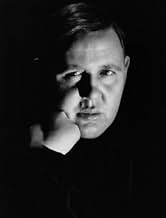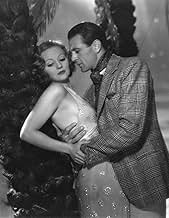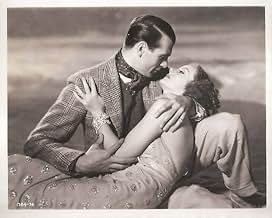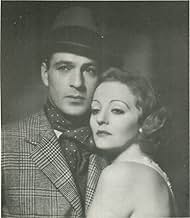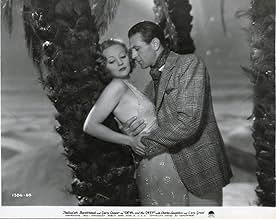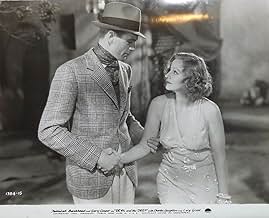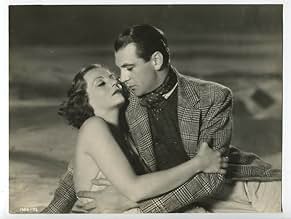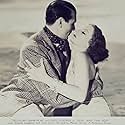A man sets out for revenge after learning of his wife's affair.A man sets out for revenge after learning of his wife's affair.A man sets out for revenge after learning of his wife's affair.
- Director
- Writers
- Stars
- Awards
- 1 win total
James Dugan
- Condover
- (as Jimmie Dugan)
Peter Brocco
- Wireless Operator
- (uncredited)
Jack Gardner
- Submarine Crewman
- (uncredited)
John George
- Man in Crowd
- (uncredited)
Henry Guttman
- Submarine Crewman
- (uncredited)
Fred Kohler Jr.
- Submarine Crewman
- (uncredited)
Anderson Lawler
- Sailor
- (uncredited)
Lucien Littlefield
- Shopkeeper
- (uncredited)
- Director
- Writers
- All cast & crew
- Production, box office & more at IMDbPro
Featured reviews
Bankhead made a handful of silent films before she became the rage of the London stage in the late 20s. Back in Hollywood, she made 7 films in 1931 and 1932. The Devil and the Deep was the penultimate one. She was not a success. It would be more than a decade before she would "face the cameras" again in 1944's brilliant Lifeboat for Alfred HItchcock.
The few of these early talkies I've seen have been fascinating because Bankhead was a STAR, and no one was quite like her. She had the allure of Garbo or Dietrich, but she was closer to Davis or Crawford or Constance Bennett in her temperament. In Faithless, Tarnished Lady, The Cheat, and Devil and the Deep she plays basically the same character: the woman who goes wrong but is saved in the end. Bankhead suffered in her 30s films from lousy directors. In Devil and the Deep, Marion Gering mis-directs by letting Charles Laughton ham it up as the husband, while Gary Cooper as the lover is boring. Bankhead holds center stage and is really very good in this VERY strange film.
It's a submarine movie set apparently in Algiers or some such place. She is the commander's bored wife. He's nuts. After her fling with Cary Grant (yes it's quite the cast), Laughton has him transferred. Cooper's fate is worse since they're all aboard the sub when all hell breaks loose.
Bankhead looks great in stylish clothing and slinks about the house and the club , the streets (amid whirling dervishes), and on the sub. Laughton is menacing and his final scene is memorable. But they're not a very believable couple. Cooper is oddly boring and is given awful lines to say. Grant, in a small part, is, well, Cary Grant. Paul Porcasi is the shop keeper, Henry Kolker and Juliette Compton are the catty club denizens. One problem is that the film is underlit so it's hard to see a lot of detail. Amusing scenes with Cooper and Bankhead staring up at the stars, buying cheap perfume, and buying a pool cue.
With a better director and better writers, this could have been a blockbuster. But it's neat to see Bankhead in her prime, before she became a campy professional star.
The few of these early talkies I've seen have been fascinating because Bankhead was a STAR, and no one was quite like her. She had the allure of Garbo or Dietrich, but she was closer to Davis or Crawford or Constance Bennett in her temperament. In Faithless, Tarnished Lady, The Cheat, and Devil and the Deep she plays basically the same character: the woman who goes wrong but is saved in the end. Bankhead suffered in her 30s films from lousy directors. In Devil and the Deep, Marion Gering mis-directs by letting Charles Laughton ham it up as the husband, while Gary Cooper as the lover is boring. Bankhead holds center stage and is really very good in this VERY strange film.
It's a submarine movie set apparently in Algiers or some such place. She is the commander's bored wife. He's nuts. After her fling with Cary Grant (yes it's quite the cast), Laughton has him transferred. Cooper's fate is worse since they're all aboard the sub when all hell breaks loose.
Bankhead looks great in stylish clothing and slinks about the house and the club , the streets (amid whirling dervishes), and on the sub. Laughton is menacing and his final scene is memorable. But they're not a very believable couple. Cooper is oddly boring and is given awful lines to say. Grant, in a small part, is, well, Cary Grant. Paul Porcasi is the shop keeper, Henry Kolker and Juliette Compton are the catty club denizens. One problem is that the film is underlit so it's hard to see a lot of detail. Amusing scenes with Cooper and Bankhead staring up at the stars, buying cheap perfume, and buying a pool cue.
With a better director and better writers, this could have been a blockbuster. But it's neat to see Bankhead in her prime, before she became a campy professional star.
Paramount, at the height of its sophistication in the early 30's, could recycle its sets from MOROCCO and fashion a stylish production out of a passable triangle melodrama. Unfulfilled wife Tallulah Bankhead --frustrated at home, humiliated in front of her social set by her pathologically jealous husband -- stumbles into an Arab marketplace crowded with whirling dervishes, and into the arms of Gary Cooper for a romantic liaison under the desert stars. Conflicts ensue, of course, and then all three find themselves on a crippled submarine.
Viewers who know Tallulah Bankhead only from her caricatured role in LIFEBOAT will be startled by her intensity and bruised glamour: slouching in Travis Banton gowns, she looks sometimes like Garbo, sometimes like "Margo Channing". Meanwhile, she gives a crash course in how to hold a melodrama together, commanding every scene, inflecting every line with subtle nuances. When she must deal with menacing Charles Laughton, the air between them vibrates with tension. Laughton [billed as "the eminent English character actor"] does his share as well, but he seems mannered in a familiar way, a dry run for his Captain Bligh.
Only the radiant young Cary Grant in a dazzling naval uniform steals attention from the leading lady in a brief appearance. Gary Cooper, though persuasive as the romantic hero, soon gets submerged in a disappointingly shallow character.
The eye is seduced by cameraman Charles Lang's repertoire of shadows, the heart is stirred by a star performance, but in the end the head may resist: the terse dialogue tries for Hemingway but remains stubbornly pedestrian and remarkably humorless: the script owes its sole laugh to Bankhead's line reading while buying a billiard cue. The devil is in the dialogue!
Viewers who know Tallulah Bankhead only from her caricatured role in LIFEBOAT will be startled by her intensity and bruised glamour: slouching in Travis Banton gowns, she looks sometimes like Garbo, sometimes like "Margo Channing". Meanwhile, she gives a crash course in how to hold a melodrama together, commanding every scene, inflecting every line with subtle nuances. When she must deal with menacing Charles Laughton, the air between them vibrates with tension. Laughton [billed as "the eminent English character actor"] does his share as well, but he seems mannered in a familiar way, a dry run for his Captain Bligh.
Only the radiant young Cary Grant in a dazzling naval uniform steals attention from the leading lady in a brief appearance. Gary Cooper, though persuasive as the romantic hero, soon gets submerged in a disappointingly shallow character.
The eye is seduced by cameraman Charles Lang's repertoire of shadows, the heart is stirred by a star performance, but in the end the head may resist: the terse dialogue tries for Hemingway but remains stubbornly pedestrian and remarkably humorless: the script owes its sole laugh to Bankhead's line reading while buying a billiard cue. The devil is in the dialogue!
'Devil and the Deep's' biggest draw was the cast. The most interesting being Charles Laughton in his first American film. Have also liked Tallulah Bankhead in other films, one of her best being 'Lifeboat', and Gary Cooper gave a lot of great performances later on when his acting style had fully developed ('High Noon', 'The Westerner' etc). So did Cary Grant. Did like the premise, which did have potential to be quite tense and intriguing and also the creepy-sounding title.
It is a shame that 'Devil and the Deep' isn't better known. For all its faults, and it has them, it is a nice, interesting film that sees most of the cast on great form (the cast are not just the main interest point of 'Devil and the Deep' but also the primary reason as to why the film just about works) and does a lot right. Not everything works and the film could have done more with its subject, though it doesn't waste it, but the flaws are outweighed by the good things.
A lot works. The best asset is the cast. Bankhead is intensely riveting in her role without going too over the top. Laughton is genuinely menacing and looked as though he was enjoying himself, the chemistry between him and Bankhead has the right amount of intensity needed. Grant is in a very early role and acquits himself very well and is charming and suave, something that he specialised in throughout his career and refined not long after this. It is nicely directed by Marion Gering (an unfamiliar director to me), especially towards the end and in the interactions between Bankhead and Laughton.
Production values are generally not too elaborate while never looking cheap, the atmospheric and suitably claustrophobic photography and eerie lighting coming off best. The music is suitably haunting without being intrusive while not having much that is distinguished. The script is patchy and undernourished at times but generally is intriguing and to me it didn't get too over-heated. The story is tautly paced relatively and carried by its atmosphere, the tense climax stands out.
Sadly, Cooper really isn't at his best. Actually thought that he was very weak and wooden and he certainly went on to much better things. To be fair though, he had a very shallow and dull character and awfully clunky dialogue (this was where the script was patchy) to work with.
It was a little bland at the start and the film changes gear very abruptly and the second half generally felt incomplete, hence some choppiness.
Bottom line, pretty good and deserving to be better known. 7/10
It is a shame that 'Devil and the Deep' isn't better known. For all its faults, and it has them, it is a nice, interesting film that sees most of the cast on great form (the cast are not just the main interest point of 'Devil and the Deep' but also the primary reason as to why the film just about works) and does a lot right. Not everything works and the film could have done more with its subject, though it doesn't waste it, but the flaws are outweighed by the good things.
A lot works. The best asset is the cast. Bankhead is intensely riveting in her role without going too over the top. Laughton is genuinely menacing and looked as though he was enjoying himself, the chemistry between him and Bankhead has the right amount of intensity needed. Grant is in a very early role and acquits himself very well and is charming and suave, something that he specialised in throughout his career and refined not long after this. It is nicely directed by Marion Gering (an unfamiliar director to me), especially towards the end and in the interactions between Bankhead and Laughton.
Production values are generally not too elaborate while never looking cheap, the atmospheric and suitably claustrophobic photography and eerie lighting coming off best. The music is suitably haunting without being intrusive while not having much that is distinguished. The script is patchy and undernourished at times but generally is intriguing and to me it didn't get too over-heated. The story is tautly paced relatively and carried by its atmosphere, the tense climax stands out.
Sadly, Cooper really isn't at his best. Actually thought that he was very weak and wooden and he certainly went on to much better things. To be fair though, he had a very shallow and dull character and awfully clunky dialogue (this was where the script was patchy) to work with.
It was a little bland at the start and the film changes gear very abruptly and the second half generally felt incomplete, hence some choppiness.
Bottom line, pretty good and deserving to be better known. 7/10
Cary Grant's charm and looks he displayed in his first movie, 1932's "This Is The Night," earned him a role in his next feature film, his second, as a potential love-interest to the wife of a naval ship commander in August 1932's "Devil and the Deep." Grant plays Lt. Jaeckel under the command of Charles Strum (Charles Laughton), a deeply flawed and extremely jealous husband to Diana Sturm (Talluhlah Bankhead). Based on Maurice Larrouy's novel, 'Sirenes et Tritons," Jaeckel sparks Strum's insane jealousy, which is unfounded by his wife's disinterest in the lieutenant. Jaeckel is quickly shipped out early in the film and is replaced by another lieutenant, Sempter (Gary Cooper), who it turns out gets kissy-wissy with Diana. Actress Bankhead said she accepted the role because she really wanted to get physically close to Cooper.
"Devil and the Deep" was Hollywood's first detailed look at the insides of a submarine. Once the U-Boat's commander Strum has his wife and her officer boyfriend Sempter underway in the underwater sub, he sets forth his plans to kill the lovers, taking along his crew for a suicidal maneuver. Laughton is clearly the star in the movie: the actor's menacing behavior fits the deranged Strum perfectly to a tee. The English-born and raised Laughton began acting on the stage in 1926 while dabbling in film during the late 1920s before securing his first major role in "Devil and the Deep." Tallulah Bankhead, primarily a stage actress, found acting in movies to be a complete bore. Her first two years in Hollywood, 1931 and 1932, were marked with her yearning to return to the live stage. "Devil and the Deep" was her second-to-last picture before reemerging on the screen twelve years later in Alfred Hitchcock's 1944 "Lifeboat."
"Devil and the Deep" marked the return to Hollywood for Gary Cooper. Burnt out and drained from an aggressive schedule of acting in ten movies within a two-year span, Cooper suffered from anemia and jaundice from his poor dietary habits. He decided to make a break from Los Angeles, feeling depressed and lonely. Reconnecting with an acquaintance, American heiress Dorothy Taylor, now a countess living in Rome, Italy, Cooper rehabilitated himself with her good food and great advice on nutrition. Developing a continental appreciation for the arts and customs of Europe, the actor's rough Western edges were smoothed out by the countess' patient tutorship. She took him on a ten-week big game safari hunting trip in Kenya, where he bagged a variety of trophy animals. His love of the wilderness kick in during the trip. In his role as the submarine's second-in-command, Cooper appears more comfortable and restrained in his role as the leader of the mutiny when it becomes obvious its commander is attempting to kill everyone on board.
"Devil and The Deep" is the only movie, besides a brief appearance in 1933's "Alice in Wonderland," Cooper and Grant ever shared credits in the same movie. This was a bit ironic since Grant had Cooper in mind when he selected his stage name Cary after the actor from Montana.
"Devil and the Deep" was Hollywood's first detailed look at the insides of a submarine. Once the U-Boat's commander Strum has his wife and her officer boyfriend Sempter underway in the underwater sub, he sets forth his plans to kill the lovers, taking along his crew for a suicidal maneuver. Laughton is clearly the star in the movie: the actor's menacing behavior fits the deranged Strum perfectly to a tee. The English-born and raised Laughton began acting on the stage in 1926 while dabbling in film during the late 1920s before securing his first major role in "Devil and the Deep." Tallulah Bankhead, primarily a stage actress, found acting in movies to be a complete bore. Her first two years in Hollywood, 1931 and 1932, were marked with her yearning to return to the live stage. "Devil and the Deep" was her second-to-last picture before reemerging on the screen twelve years later in Alfred Hitchcock's 1944 "Lifeboat."
"Devil and the Deep" marked the return to Hollywood for Gary Cooper. Burnt out and drained from an aggressive schedule of acting in ten movies within a two-year span, Cooper suffered from anemia and jaundice from his poor dietary habits. He decided to make a break from Los Angeles, feeling depressed and lonely. Reconnecting with an acquaintance, American heiress Dorothy Taylor, now a countess living in Rome, Italy, Cooper rehabilitated himself with her good food and great advice on nutrition. Developing a continental appreciation for the arts and customs of Europe, the actor's rough Western edges were smoothed out by the countess' patient tutorship. She took him on a ten-week big game safari hunting trip in Kenya, where he bagged a variety of trophy animals. His love of the wilderness kick in during the trip. In his role as the submarine's second-in-command, Cooper appears more comfortable and restrained in his role as the leader of the mutiny when it becomes obvious its commander is attempting to kill everyone on board.
"Devil and The Deep" is the only movie, besides a brief appearance in 1933's "Alice in Wonderland," Cooper and Grant ever shared credits in the same movie. This was a bit ironic since Grant had Cooper in mind when he selected his stage name Cary after the actor from Montana.
... and in fact only the last thirty minutes or so has much suspense or tension.
Commander Charles Sturm (Charles Laughton) of the U. S. Navy is well liked by his men and their wives. However, his own wife Diana (Tallulah Bankhead) is not well liked. She appears snooty and glum. In fact she is just a very sad person because her husband is insanely jealous without cause and even violent sometimes. In fact he has been to a doctor and is just plain insane and delusional, and this has killed what love she had for him. He even has a fellow officer, Lt. Jaekel (Cary Grant) transferred for inefficiency just because he is so sure Jaekel and his wife are involved. His wife even has an impromptu conversation with Jaekel with her husband listening nearby to prove it's not true but he remains unconvinced.
So Diana takes a walk through the North African town in which they are stationed, meets a stranger, and gets romantically involved with that stranger. What she doesn't know is that the man is her husband's new second in command to replace the one he transferred, Lt. Sempter (Gary Cooper). So Sturm's old jealousies begin to rise up again, except for once he is right. And a submarine is a terrible place in which to play out a love triangle. Complications ensue.
This is noteworthy for the once-in-a-lifetime cast. Laughton gets an "introducing" credit as being that "noted British character actor". Laughton goes big and florid with his performance, Cooper gives his normal "aw shucks" performance, and Bankhead plays it quiet and sullen. Bankhead is best when she's the one handing out the withering one-liners, so the film may have worked better with a more conventional and vulnerable leading lady.
Commander Charles Sturm (Charles Laughton) of the U. S. Navy is well liked by his men and their wives. However, his own wife Diana (Tallulah Bankhead) is not well liked. She appears snooty and glum. In fact she is just a very sad person because her husband is insanely jealous without cause and even violent sometimes. In fact he has been to a doctor and is just plain insane and delusional, and this has killed what love she had for him. He even has a fellow officer, Lt. Jaekel (Cary Grant) transferred for inefficiency just because he is so sure Jaekel and his wife are involved. His wife even has an impromptu conversation with Jaekel with her husband listening nearby to prove it's not true but he remains unconvinced.
So Diana takes a walk through the North African town in which they are stationed, meets a stranger, and gets romantically involved with that stranger. What she doesn't know is that the man is her husband's new second in command to replace the one he transferred, Lt. Sempter (Gary Cooper). So Sturm's old jealousies begin to rise up again, except for once he is right. And a submarine is a terrible place in which to play out a love triangle. Complications ensue.
This is noteworthy for the once-in-a-lifetime cast. Laughton gets an "introducing" credit as being that "noted British character actor". Laughton goes big and florid with his performance, Cooper gives his normal "aw shucks" performance, and Bankhead plays it quiet and sullen. Bankhead is best when she's the one handing out the withering one-liners, so the film may have worked better with a more conventional and vulnerable leading lady.
Did you know
- TriviaAt no point is the navy that Charles Laughton, Cary Grant and Gary Cooper belong to named. That the officers are English and others American would not make sense in the British or U.S. navy, but no flags or emblems are seen, and their uniforms belong to no known country on earth.
- Quotes
Cmdr. Charles Sturm: [to Lt Sempter] It must be a happy thing to look like you do. I suppose women love you. I've never had that. Must be a happy thing.
- Crazy creditsAnd introducing CHARLES LAUGHTON The eminent English character actor in the role of THE COMMANDER
- ConnectionsFeatured in MsMojo: Top 10 Biggest Old Hollywood Scandals (2023)
- How long is Devil and the Deep?Powered by Alexa
Details
- Release date
- Country of origin
- Language
- Also known as
- Pod žarkim sunca Ekvatora
- Filming locations
- Production company
- See more company credits at IMDbPro
- Runtime
- 1h 18m(78 min)
- Color
- Aspect ratio
- 1.37 : 1
Contribute to this page
Suggest an edit or add missing content

